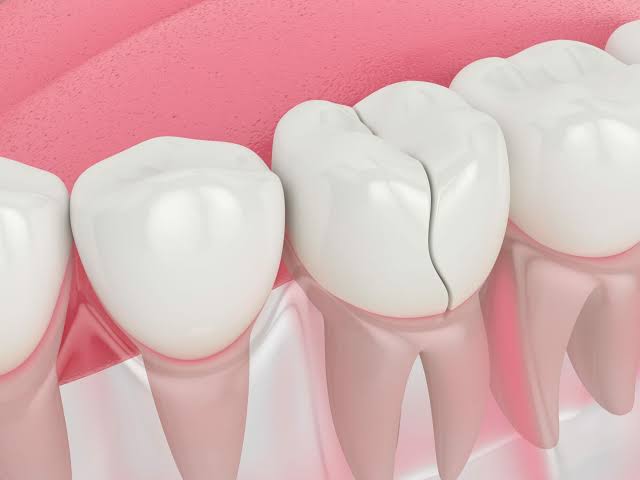What Is A Broken or Chipped Tooth ?
A broken or chipped tooth is a trauma that requires immediate care. Several things, like falling, being hurt while playing sports, biting down on something hard, using cigarettes, grinding your teeth, and so forth, might result in a broken tooth. The front teeth, the back teeth, or the molars are the teeth that are most frequently affected by broken teeth.
Enamel is the strong outer coating that covers every tooth. The human body’s toughest substance is enamel. It safeguards the nerve and blood vascular tissues of the tooth.
The main cause of dental pain and deterioration, which can possibly shatter your teeth, is cavities. You can shatter a tooth or split the enamel by biting onto something hard, having a filling come away, or getting hurt while playing sports.
In order to prevent future damage or problems, a fractured tooth must be repaired by a dentist, which might be unpleasant. However, there are certain pain and symptom management techniques you may use on your own. Let’s look at it.
Managing Symptoms of a Broken Tooth
Not all fractured teeth hurt, and the discomfort may come and go. However, if your tooth’s dentin or exposed nerves are exposed, your tooth may be extremely sensitive (particularly to cold beverages).
It’s possible for your tongue and cheek to get injured if a broken tooth leaves a sharp edge.
There are home remedies for fractured tooth pain until you can visit a dentist. Although they will momentarily improve your comfort, these therapies should never take the place of visiting a doctor or dentist.
• To clean your mouth, rinse.
Every time you eat, gently rinse your mouth to remove food particles from the area surrounding the damaged tooth. You can rinse with normal, warm water, saline water, or a solution of water and hydrogen peroxide in equal parts. Do not, however, swirl vigorously. Infection and more discomfort may be prevented in this way.
• Ice to lessen bruising
Apply ice for as long as necessary in 15-minute intervals if your face is swollen. Wrap an ice pack or cold pack in a towel and apply it to the swollen area of your face. It can take days for swelling and bruises to go down if your broken tooth was caused by an impact or injury sustained during sports.
• For blood, use gauze.
Place a piece of clean gauze inside your mouth close to the injured area to stop bleeding. When gauze becomes bloody, replace it.
• Eat only what you can stomach.
An exposed nerve in a damaged tooth may be particularly sensitive to specific foods and conditions.
Avoid:
Anything too chewy that puts pressure on the tooth, like steak, jerky, gum, and candy. Acidic soda, alcohol, and coffee cold beverages, which can cause painful zinging in exposed nerve. Nuts and celery, which can get stuck in the tiny cracks in the tooth. Fruits with seeds, like strawberries and raspberries. Extremely sugary foods, as sugar gives bacteria in your mouth more to feed on and can increase decay in your teeth.
Instead, consider consuming nourishing soft foods like soup, roasted veggies, and smoothies.
• Use your opposite-side mouth to chew.
Food should be chewed away from the damaged tooth to prevent further pressure.
• Use pain medication.
Anti-inflammatories like ibuprofen or naproxen can reduce pain and swelling when taken according to the guidelines on the package or a doctor’s advice.
• inexpensive tooth restoration
Temporary dental fillings are available at the pharmacy to lessen the sharpness if your tooth is damaged and cutting against your tongue. Keep in mind that this is only a short-term, temporary fix. Seek emergency medical assistance if your tooth has been fractured as a result of severe stress or injury.
5 Things You Should Know About Chipped Or Broken Tooth
• Usually, a little surface break on a tooth doesn’t require treatment.
• Your tooth may only require polishing to soften the edge of a chip.
• A tooth that has been broken all the way through will require filling. You could also require a root canal if the break caused pain to the nerve tissue.
• Extremely fractured teeth may bleed and need surgery to preserve the tooth and its root. Both the cusp and the root (beneath the gums) of the tooth, which is where chewing occurs, can experience tooth breaks.
• Your dentist will determine if a tooth has to be extracted if decay (a buildup of plaque that causes cavities) caused it to break.
Call your dentist as soon as possible if you break a tooth.



